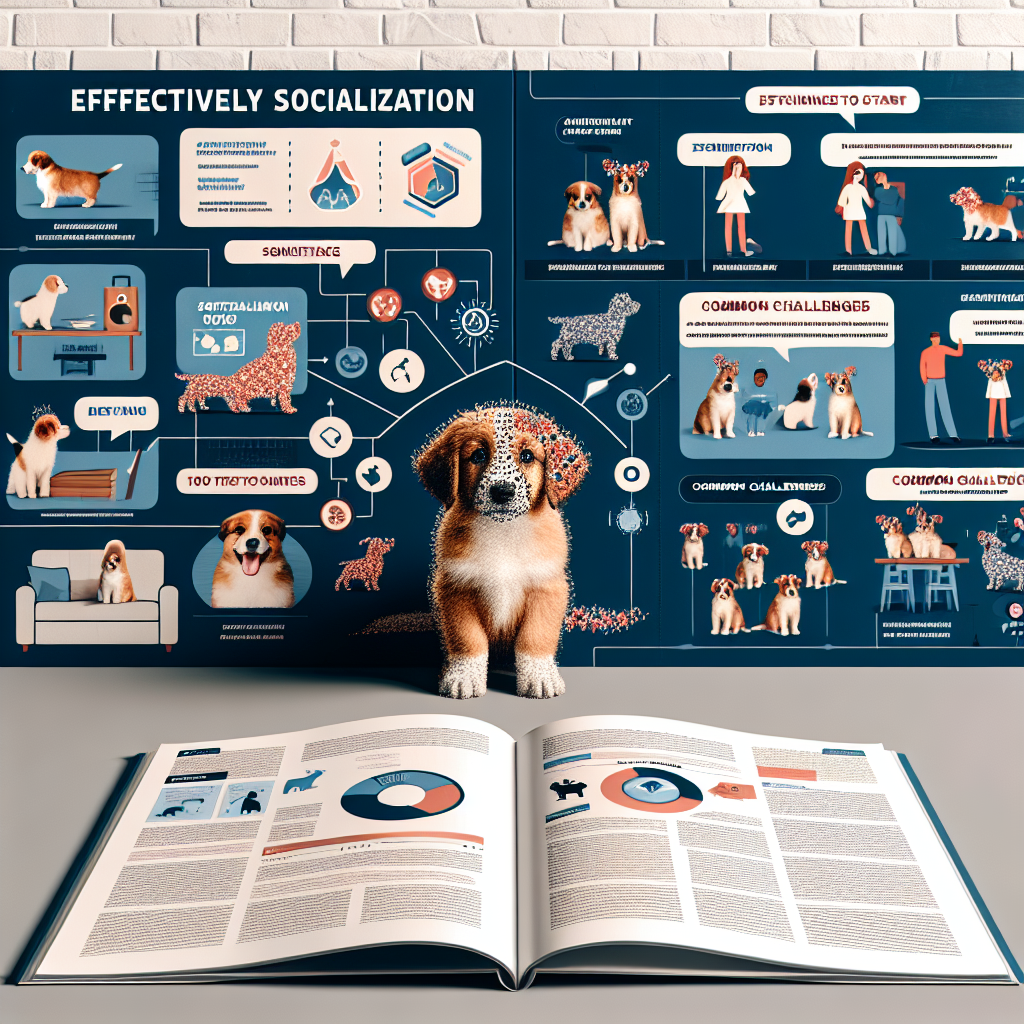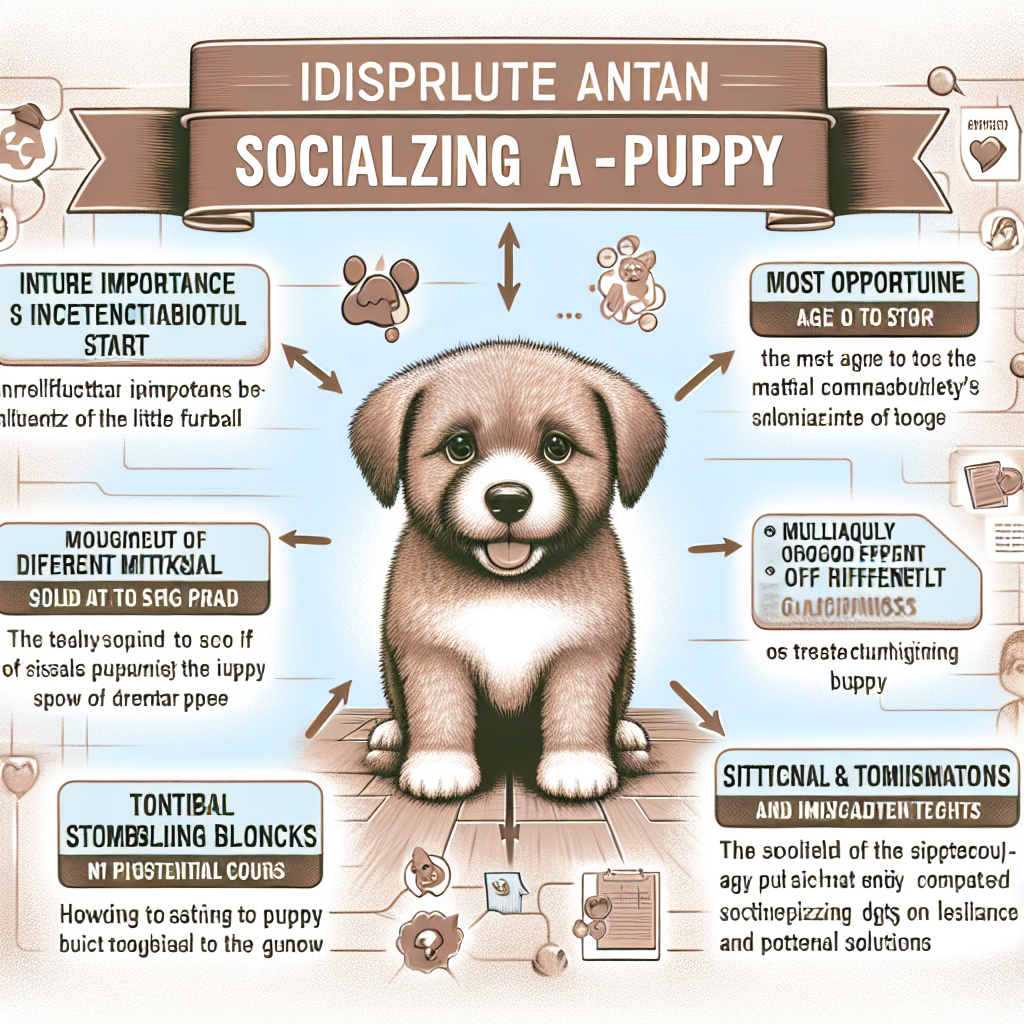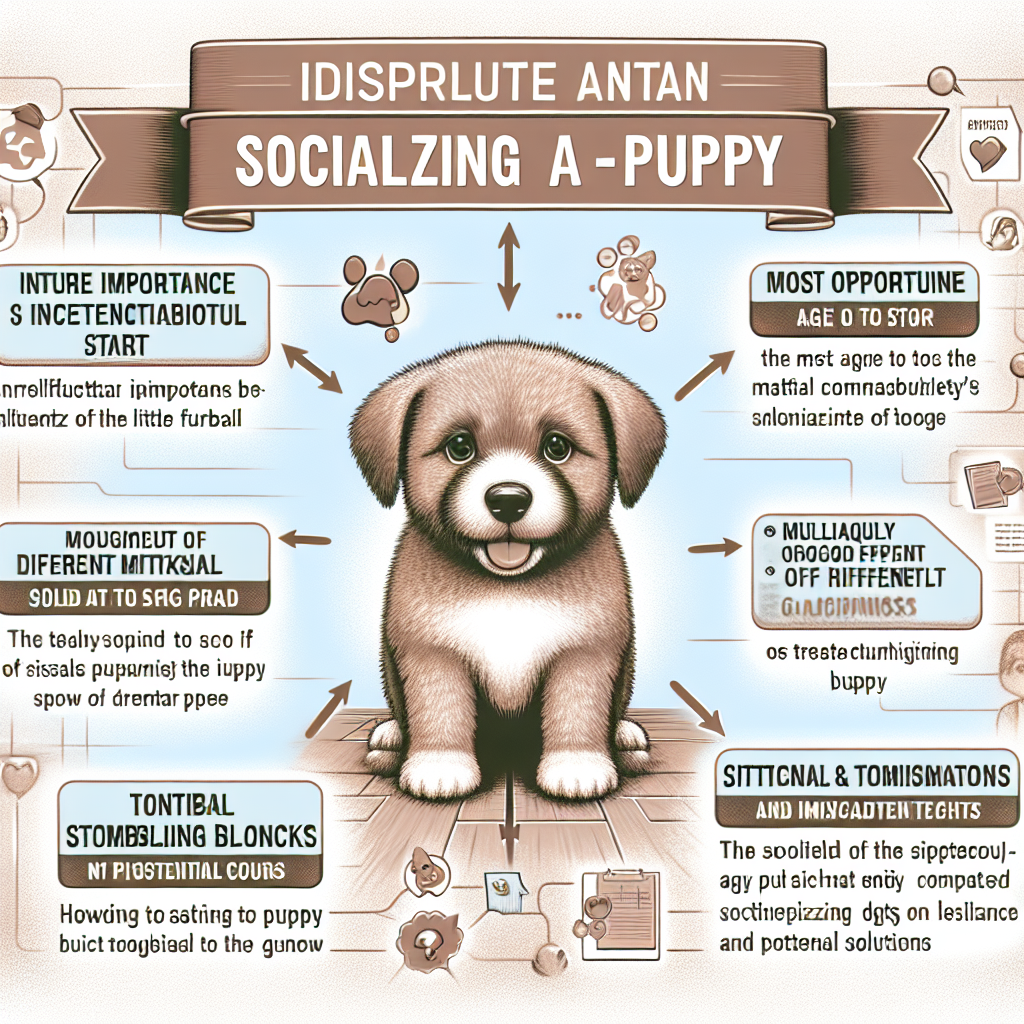In this ultimate guide, you will uncover the key steps to ensure your puppy thrives and grows into a well-rounded and confident dog. From introducing your furry friend to new experiences and environments, to fostering positive interactions with other dogs and humans, we will walk you through the essential techniques to effectively socialize your puppy. With our expert tips and helpful strategies, you will be equipped with the knowledge to create a strong foundation for your pup’s social skills and overall happiness. So, grab your puppy’s leash and get ready to embark on an exciting journey of socialization!
Why is Puppy Socialization Important?
Early socialization
When you bring a new puppy into your home, one of the first things you should prioritize is socialization. Early socialization is crucial for puppies to develop into well-rounded and confident adult dogs. During the first few months of their lives, puppies are like sponges, absorbing experiences and learning how to navigate the world. By introducing them to a variety of people, animals, and environments, you can help them become comfortable and adaptable in different situations.
Preventing behavior problems
Socializing your puppy at an early age can also help prevent future behavior problems. Puppies who are not properly socialized may exhibit fear, aggression, or anxiety when faced with new situations or stimuli. By exposing them to new experiences in a controlled and positive manner, you can help them build resilience and reduce the risk of developing undesirable behaviors.
Building confidence
Socialization plays a crucial role in building confidence in puppies. By gradually exposing them to new experiences and environments, you are helping them develop a sense of security and trust in the world around them. A confident puppy is more likely to handle new situations with ease, making them less prone to anxiety and fear as they grow older.
When to Start Socializing Your Puppy
The critical period
The critical period for puppy socialization is between 3 to 14 weeks of age. During this time, puppies are most receptive to new experiences and are more likely to form positive associations with stimuli they encounter. It is crucial to start socializing your puppy during this period to lay the foundation for their future behavior and development.
Vaccination schedule
While it is important to start socializing your puppy early, it is also essential to follow their vaccination schedule. Puppies are vulnerable to contagious diseases, and their immune systems are still developing. Consult with your veterinarian to ensure that your puppy has received the necessary vaccinations before exposing them to unfamiliar environments or animals.
Consulting with a veterinarian
Before embarking on your puppy’s socialization journey, it is always a good idea to consult with a veterinarian. A veterinarian can provide guidance specific to your puppy’s health and individual needs. They can also advise you on the appropriate steps to socialize your puppy safely and help address any concerns you may have.
Places and Environments for Socializing
Home
The home environment is the first place where your puppy becomes familiar with everyday sights, sounds, and smells. It is essential to create a positive and enriching environment for your puppy, introducing them to household activities, different surfaces, and various household items. This will help them feel secure and confident in their own surroundings.
Friend’s homes
Introducing your puppy to different homes and environments can help them become comfortable in unfamiliar settings. Arrange playdates with friends who have well-behaved dogs or other pets. This will allow your puppy to learn how to interact with different animals and experience new surroundings in a controlled and safe manner.
Dog parks
Dog parks can be a valuable place for your puppy to socialize and interact with other dogs. However, it is important to ensure that the dog park is a safe and suitable environment. Make sure the park is well-maintained, provides separate areas for small and large dogs, and has a friendly and responsible dog owner community. Always supervise your puppy closely and monitor their interactions to ensure positive experiences.
Pet-friendly stores
Taking your puppy to pet-friendly stores is an excellent way to expose them to a variety of sights, sounds, and people. Many stores allow dogs on a leash, providing an opportunity for your puppy to encounter new stimuli and practice good behavior in public settings. Remember to reward and reinforce positive behavior during these outings.

Groomers
Regular grooming is an essential part of your puppy’s care, and early socialization can make these experiences more enjoyable for them. Take your puppy to a reputable and reliable groomer who understands the importance of positive and patient handling. Slowly introduce your puppy to the grooming process, starting with shorter sessions and gradually increasing the duration to help them become comfortable with grooming procedures.
Veterinary clinics
Visiting the vet can be a stressful experience for puppies if they haven’t been properly socialized to medical environments. Make regular visits to the veterinarian for routine check-ups, vaccinations, and preventive care. By exposing your puppy to the sights, sounds, and smells of a veterinary clinic, you can help them develop a positive association with these visits, reducing stress and anxiety.
Introducing Your Puppy to People
Immediate family members
The first people your puppy should get acquainted with are immediate family members. These individuals will become the primary caregivers and companions for your puppy. Encourage gentle and positive interactions, allowing your puppy to form bonds and establish trust with family members from an early age.
Extended family and friends
After your puppy has become comfortable with immediate family members, gradually introduce them to extended family and friends. Make sure that these encounters are positive and calm, allowing your puppy to approach and interact with new people at their own pace. Remind your family and friends to be patient and gentle when interacting with your puppy, providing treats or toys to reinforce positive associations.
Strangers
Puppies should also be exposed to strangers in a controlled and positive manner. This can help prevent fear or aggression towards unfamiliar people in the future. Start with brief introductions to individuals who are calm and comfortable around dogs. Slowly increase the complexity of these encounters, exposing your puppy to people of different ages, genders, and appearances, always ensuring that the interactions are pleasant for everyone involved.
Children
Introducing your puppy to children is crucial, as they may encounter them frequently in various situations. Make sure that interactions between children and your puppy are closely supervised and controlled to prevent accidental harm to either party. Teach children the proper way to approach and handle a puppy, emphasizing the importance of gentle and respectful behavior. Proper socialization can help your puppy develop positive associations with children, ensuring safe and enjoyable interactions in the future.
Exposing Your Puppy to Animals
Other dogs
Socializing your puppy with other dogs is essential for them to learn appropriate social skills and canine communication. Organize controlled and supervised playdates with well-behaved and vaccinated dogs. These interactions will help your puppy understand boundary cues, proper play behavior, and establish positive relationships with fellow canines.
Cats and small pets
If you have cats or small pets in your household, it is important to ensure that your puppy is introduced to them in a controlled and supervised manner. Allow them to observe each other from a distance, gradually decreasing the separation as they become more comfortable. Reward calm and respectful behavior from your puppy, and provide a safe space for your other pets to retreat to if needed.
Livestock
If you live in a rural area or have access to livestock, exposing your puppy to farm animals is beneficial. This exposure allows them to become familiar with larger animals and different smells, sights, and sounds. Always ensure the safety of both your puppy and the livestock by keeping them separated by a fence or other barriers. Gradually increase the proximity of these encounters as your puppy becomes more comfortable.
Wildlife
Exposing your puppy to wildlife can create a deeper understanding and respect for nature. While it is important to give your puppy the opportunity to observe and experience wildlife, it must be done in a safe and controlled manner. Keep your puppy leashed and ensure that encounters are brief and at a distance to avoid any potential harm. Always prioritize the safety of both your puppy and the wild animals.
Positive Reinforcement Training for Socialization

Reward-based training
Positive reinforcement training is an effective method to encourage desired behavior in your puppy. Use treats, praise, and affection to reward your puppy for exhibiting desirable social behaviors, such as calm greetings or responding to commands. Rewards help shape your puppy’s behavior and create positive associations with socialization experiences.
Clicker training
Clicker training is a popular and effective technique that utilizes a distinct sound to mark desirable behavior. By pairing the click with a reward, your puppy learns to associate the sound with positive reinforcement. This method can be especially helpful for reinforcing socialization behaviors and teaching your puppy to engage in appropriate interactions with people and animals.
Behavioral cues
Teaching your puppy basic behavioral cues, such as sit, stay, or leave it, can be invaluable during socialization. These cues provide a framework for your puppy to understand what is expected of them in various situations. By consistently using these cues and rewarding desired behavior, you can effectively communicate with your puppy and guide them through social interactions.
Handling Different Environments and Situations
Car rides
Exposing your puppy to car rides from an early age can help them become comfortable and relaxed during future travels. Start with short trips and gradually increase the duration. Provide a safe and comfortable space, such as a crate or a secure seat harness, for your puppy during car rides. Reward your puppy with treats and praise for calm behavior, creating positive associations with traveling in the car.
Visiting public spaces
Visiting public spaces, such as parks or outdoor events, is an essential part of socialization. Introduce your puppy to different sights, sounds, and smells in a controlled manner. Start with quiet and less crowded areas, gradually exposing them to busier environments. Remember to reinforce positive behavior and provide ample opportunities for your puppy to have positive interactions with people and other animals.
Noise exposure
Exposing your puppy to various noises can help them become more comfortable and less fearful of loud or unfamiliar sounds. Start with low-level noise, such as household appliances or gentle music, and gradually introduce louder noises, such as vacuum cleaners or sirens. Monitor your puppy’s reaction and comfort level during these exposures, always ensuring that they feel safe and secure.
Socializing in Different Age Stages
Early development stage
During the early development stage, which typically lasts from 3 weeks to 14 weeks old, puppies are most receptive to socialization. This is the ideal time to introduce them to new experiences, people, and animals. The experiences they have during this period can shape their behavior and attitudes towards the world around them. Prioritize positive and controlled socialization experiences to help your puppy develop into a confident and well-adjusted adult dog.
Adolescence
As puppies enter their adolescent stage, around 6 months to 2 years old, they may start exhibiting behavioral changes and testing boundaries. Despite these changes, it is crucial to continue socializing your puppy during this stage. Reinforce positive behaviors and consistently expose them to new environments, people, and animals. Consistency and patience are key during this phase to help your puppy navigate their independence while maintaining positive social skills.
Adult stage
Even though the critical socialization period ends around 14 weeks, continuing to socialize your puppy throughout their adult life is important. Regular exposure to new experiences, environments, people, and animals will help reinforce the social skills and confidence they developed during their early development stage. Socializing your adult dog will ensure that they remain comfortable and well-adjusted in a variety of situations.
Common Challenges in Puppy Socialization
Fear and anxiety
Some puppies may exhibit fear or anxiety in response to new experiences or stimuli. Fearful behavior can range from trembling and hiding to barking and lunging. If you notice fear or anxiety in your puppy, it is important to address it with patience and positive reinforcement. Gradual exposure, counter-conditioning, and seeking professional help, if needed, can help your puppy overcome their fears and build confidence.
Aggression
Aggression in puppies can manifest in different ways, such as growling, snapping, or biting. Aggression should never be ignored or dismissed, as it can escalate and become a serious issue. If your puppy displays aggressive behavior, consult with a professional trainer or behaviorist to determine the root cause and develop a tailored training plan. Addressing aggression early on is important for the safety of your puppy and others.
Resource guarding
Resource guarding refers to the behavior of protecting valuable resources, such as food, toys, or sleeping areas. Some puppies may display guarding behaviors, such as growling, snapping, or even biting when someone approaches their resources. Early socialization and training can help prevent or mitigate resource guarding. Teach your puppy to associate positive experiences with people approaching their resources by rewarding calm and non-protective behavior.
Separation anxiety
Separation anxiety is a common problem in puppies and can manifest as excessive whining, destructive behavior, or excessive salivating when left alone. Proper socialization and training from an early age can help prevent or reduce separation anxiety. Gradually acclimate your puppy to being alone for short periods, providing them with interactive toys or puzzles to keep them occupied. Seek professional help if separation anxiety persists or worsens.
Overcoming Socialization Challenges
Gradual exposure
When faced with socialization challenges, gradual exposure is often the key to success. Start with low-intensity environments or stimuli, gradually building up to more challenging situations. This gradual approach allows your puppy to adjust and build confidence at their own pace, reducing fear and anxiety.
Desensitization and counter-conditioning
Desensitization and counter-conditioning are techniques used to change your puppy’s emotional response to specific stimuli. By exposing your puppy to the fear-inducing stimulus in a controlled and positive manner, while pairing it with rewards or pleasant experiences, you can help them overcome their fear or anxiety. This process should be done gradually and under the guidance of a professional, to ensure your puppy’s safety and well-being.
Seeking professional help
If you are facing significant challenges or if your puppy’s socialization issues are causing distress or potential harm, it is essential to seek professional help from a certified dog trainer or animal behaviorist. These professionals have the expertise and experience to assess your puppy’s behavior, design a customized training plan, and provide guidance and support throughout the socialization process.
In conclusion, puppy socialization is a vital aspect of raising a well-rounded and confident adult dog. Early socialization, starting during the critical period, can prevent behavior problems and build your puppy’s confidence. Introduce your puppy to various places, people, and animals in a positive and controlled manner. Utilize positive reinforcement training techniques and handle different environments and situations gradually. Remember to continue socializing your puppy throughout their different age stages and address any socialization challenges with patience and professional help if needed. With proper socialization, your puppy can grow into a happy and well-adjusted companion for many years to come.

